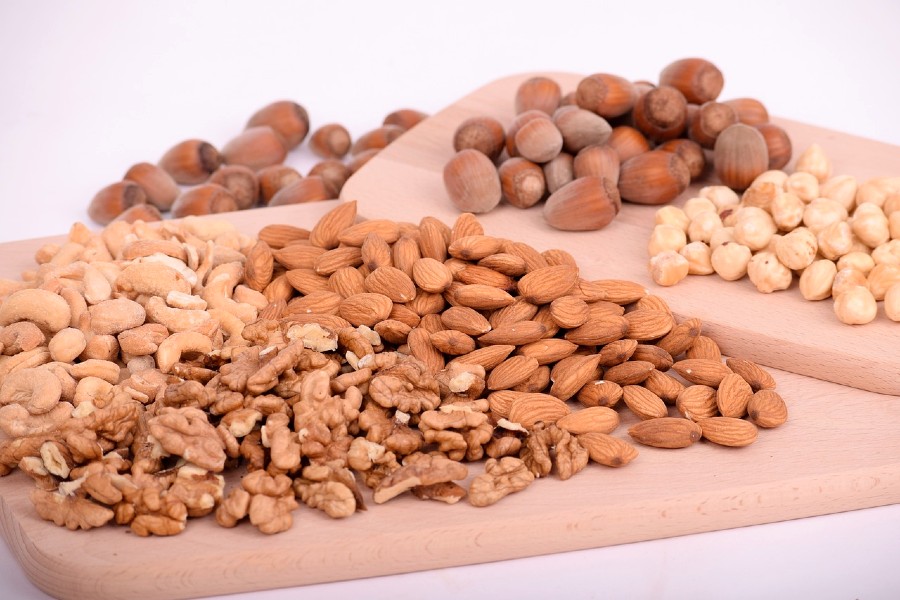
Fitness and nutrition work in conjunction to achieve optimal health and well-being.
The right balance of nutrients is essential to fuel your workouts, recover from them, and maintain overall health. To better understand how these two relate, we’ve curated a comprehensive nutritional guide to fitness, highlighting the key aspects of nutrition you need to know.
Macronutrients
Carbohydrates
Carbohydrates are the body’s primary energy source, essential for fueling your workouts. They are broken down into glucose, which provides energy to your muscles and brain.
According to the Dietary Guidelines for Americans, 45-65% of your daily calories should come from carbohydrates [1]. Therefore, it is important to consume both simple and complex carbohydrates.
Simple carbs, such as fruits and honey, provide quick energy, while complex carbs, like whole grains, beans, and vegetables, offer sustained energy throughout the day.
Proteins
Proteins are the building blocks of your body, essential for muscle growth, repair, and maintenance. Protein is crucial for fitness enthusiasts in aiding muscle tissue repair. Protein-rich foods include lean meats, poultry, fish, eggs, dairy, legumes, and plant-based alternatives like tofu and tempeh. The recommended daily allowance (RDA) for protein is 0.8 grams per kilogram of body weight, but athletes and active individuals may require more [1].
For more on protein, feel free to read this article: Maximizing Protein Absorption: How Much Protein Can Your Body Actually Use?
Fats
Fats are essential for hormone production, cell function, and energy storage. They are also vital for the absorption of fat-soluble vitamins.
Consuming healthy fats, such as monounsaturated and polyunsaturated fats found in olive oil, avocados, nuts, and seeds, can support your fitness goals by providing energy and reducing inflammation. The Dietary Guidelines for Americans recommend that 20-35% of your daily calories come from fats, with saturated fats kept below 10% [1].
Micronutrients
Vitamins
Vitamins are organic compounds that help regulate various body functions, such as metabolism, immune function, and cell growth. Fitness enthusiasts should pay attention to vitamins like A, C, D, E, and K and the B-complex vitamins, which play a role in energy production, muscle recovery, and red blood cell formation.
Vitamin A supports vision, immune function, and skin health, while Vitamin C aids in collagen production and immune system function. Vitamin D is essential for calcium absorption and bone health, while Vitamin E acts as an antioxidant, protecting cells from damage.
Vitamin K is crucial for blood clotting and bone metabolism. In addition, the B-complex vitamins help convert food into energy, support brain function, and aid in the formation of red blood cells. So to meet your vitamin requirements, ensure you eat a well-rounded diet rich in fruits, vegetables, whole grains, lean meats, and dairy.
Minerals
Minerals are inorganic substances that help with numerous bodily functions, including bone health, nerve function, and fluid balance. Key minerals for fitness include calcium, magnesium, potassium, sodium, and iron. You can achieve adequate mineral intake through a balanced diet consisting of dairy products, leafy greens, nuts, seeds, and whole grains.
Hydration
Proper hydration is crucial for fitness and overall health. Water helps regulate body temperature, transports nutrients, and removes waste products. On the other hand, dehydration can impair athletic performance, reduce mental focus, and increase the risk of injury. So aim to drink at least 8 cups (64 ounces) of water daily, and adjust your intake based on factors such as exercise intensity, duration, and environmental conditions.
Putting It All Together
To support your fitness journey, ensure your diet includes a balance of carbohydrates, proteins, and fats, as well as an abundance of vitamins and minerals. Staying well-hydrated is also essential for optimal performance and recovery. It’s important to remember that everyone’s nutritional needs vary based on factors like age, sex, body composition, and activity level. Consult a registered dietitian or nutritionist for personalized advice tailored to your specific needs and goals.
Maintaining a well-rounded diet and staying hydrated will enable you to achieve your fitness goals and improve your overall health.
In Conclusion
A well-planned nutritional strategy is vital for fitness success. To optimize your performance and recovery, focus on consuming a balanced diet rich in carbohydrates, proteins, healthy fats, and various vitamins and minerals. In addition, seek professional guidance from a registered dietitian or nutritionist, and remember to stay hydrated.
Reference Link:
[1] U.S. Department of Health and Human Services and U.S. Department of Agriculture. 2020-2025 Dietary Guidelines for Americans. 9th Edition. December 2020. Available at DietaryGuidelines.gov.
Become a Harlem Insider!
By submitting this form, you are consenting to receive marketing emails from: Harlem World Magazine, 2521 1/2 west 42nd street, Los Angeles, CA, 90008, https://www.harlemworldmagazine.com. You can revoke your consent to receive emails at any time by using the SafeUnsubscribe® link, found at the bottom of every email. Emails are serviced by Constant Contact








